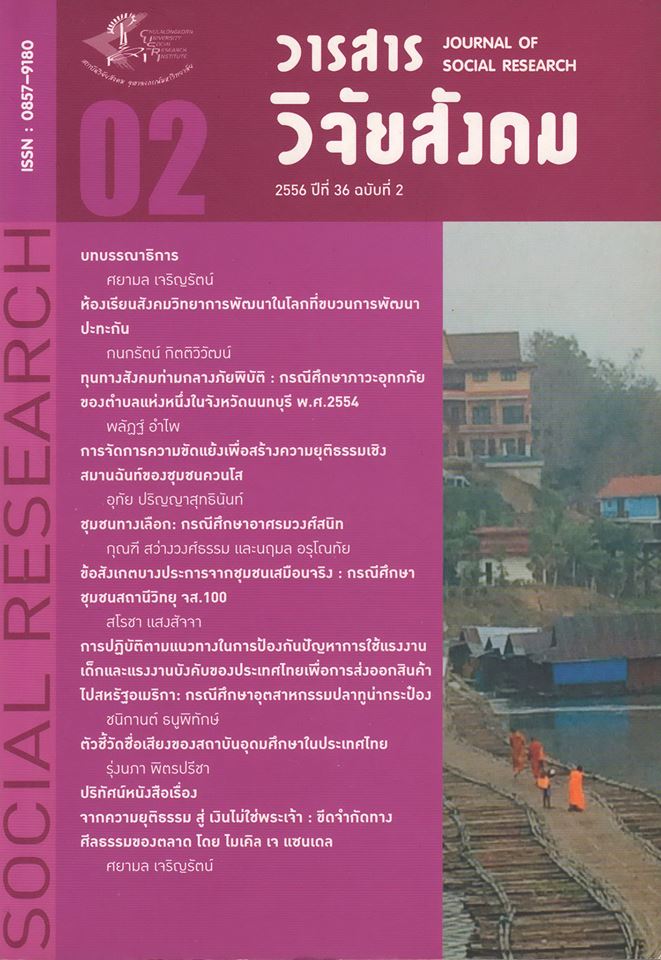การจัดการความขัดแย้งเพื่อสร้างความยุติธรรมเชิงสมานฉันท์ของชุมชนควนโส
Main Article Content
บทคัดย่อ
การวิจัยนี้เป็นการวิจัยเชิงคุณภาพ มีวัตถุประสงค์เพื่อศึกษาการจัดการความขัดแย้งเพื่อสร้างความยุติธรรมเชิงสมานฉันท์ของชุมชนควนโส ตำบลควนโส อำเภอควนเนียง จังหวัดสงขลา โดยใช้การสัมภาษณ์แบบเจาะลึกผู้นำชุมชน เจ้าหน้าที่รัฐในพื้นที่และกลุ่มชาวบ้านทั้ง 11 หมู่บ้าน ตลอดจนใช้การสนทนากลุ่มและการสังเกตแบบมีส่วนร่วมและไม่มีส่วนร่วม ผลการศึกษาพบว่า ความขัดแย้งที่เกิดขึ้นในชุมชนมีหลายคู่กรณีทั้ง ระหว่างชาวบ้านในชุมชน ระหว่างคนในและคนนอกชุมชน และระหว่างรัฐกับชุมชน โดยมีความขัดแย้งทั้งในระดับที่แสดงออกและไม่แสดงออกรวมถึงความขัดแย้งที่อยู่ในระดับความคิด โดยที่มาของความขัดแย้งส่วนใหญ่ เกี่ยวข้องกับการใช้ทรัพยากรของชุมชนทั้งในมิติการใช้ประโยชน์ที่ดิน การใช้ ทรัพยากรจากป่าเสม็ด และการทำประมง ซึ่งทุกมิติมีความเชื่อมโยงกัน ทั้งนี้ ชุมชนมีรูปแบบการจัดการความขัดแย้งตั้งแต่ใช้การเจรจาไกล่เกลี่ยโดยอาศัยระบบเครือญาติและผ่านคนกลางซึ่งเป็นที่ยอมรับนับถือและไว้เนื้อเชื่อใจกัน ส่วนความขัดแย้งระหว่างชาวบ้านและรัฐ ยังคงเป็นความขัดแย้งที่ต้องร่วมกันหาแนวทางผสานความร่วมมือเพื่อการจัดการทรัพยากรของชุมชนต่อไป กล่าวได้ว่าปัญหาและที่มาของความขัดแย้งและการจัดการความขัดแย้งของชุมชนต่างๆ ส่วนใหญ่มีความคล้ายคลึงกัน โดยมักเกี่ยวข้องกับทรัพยากรของชุมชน
อนึ่ง เมื่อความขัดแย้งเกิดขึ้น หากสังคมยึดหลักแนวคิดสมานฉันท์ที่มีหลักการคิดเชิงบวก มุ่งเน้นการแก้ปัญหาความขัดแย้งโดยสร้างความสมานฉันท์เพื่อให้เกิดการฟื้นสัมพันธภาพระหว่างคู่กรณี หรือการยอมรับเข้าใจซึ่งกันและกันอย่างมีความเอื้ออาทรและมีความเมตตา ย่อมเป็นแนวทางลดปัญหาความขัดแย้งที่เกิดขึ้นในชุมชนได้ ทั้งยังเป็นอีกแนวทางหนึ่งในการพัฒนากระบวนการยุติธรรมเชิงสมานฉันท์ให้เกิดขึ้นอย่างเป็นระบบและมีประสิทธิผล
Conflict Management for Empowerment of Restorative Justice of Khuan So Community
This qualitative research aimed to investigate conflict management for empowerment of restorative justice of Khuan So Community, Khuan So Sub-district, Khuan Niang District, Songkhla Province. In-depth interviews were conducted with community leaders, local government officials, and residents of eleven villages along with group discussions, participatory and non-participatory observations. The results of the research reflected that there were several conflict parties: people in the community, people in the community and people from outside and the government and the community. Some of the conflicts were at the level that they were expressed while others were not, including conflicts of ideas. The causes of most of the conflicts were associated with community resources in the dimensions of land use, making use of resources from the Melaleuca forest and fishing. All these dimensions were connected. The conflict management used by the community was negotiations through kinship and respected and trusted mediators. However, conflicts between people in the community and the government remained to be resolved mutually, and cooperation in community resources management was necessary. It can be said that most of the problems and causes of the conflicts and conflict management of most communities are similar in that they are associated with community resources.
In addition, when a conflict emerges, if the society holds on to a positive concept of compromise focusing on conflict resolutions that rehabilitate relationships between the conflict parties, or mutual understanding with caring and merciful attitudes, then there is a way to reduce the conflict in the community. Moreover, there can also be a way to develop a process of restorative justice systematically and effectively.
Article Details
1) บทความนี้เป็นลิขสิทธิ์ของสถาบันวิจัยสังคม จุฬาลงกรณ์มหาวิทยาลัย แต่ความคิดเห็นและเนื้อหาเป็นของผู้แต่ง
2) ทัศนะและความคิดเห็นที่ปรากฏในบทความในวารสารวิจัยสังคมและปริทัศน์ สถาบันวิจัยสังคม จุฬาลงกรณ์มหาวิทยาลัย ถือเป็นความรับผิดชอบของผู้แต่งบทความนั้น และไม่ถือเป็นทัศนะและความรับผิดชอบของกองบรรณาธิการวารสารวิจัยสังคมและปริทัศน์ สถาบันวิจัยสังคม จุฬาลงกรณ์มหาวิทยาลัย กองบรรณาธิการไม่สงวนสิทธิ์ในการคัดลอก แต่ให้ระบุถึงการอ้างอิง


